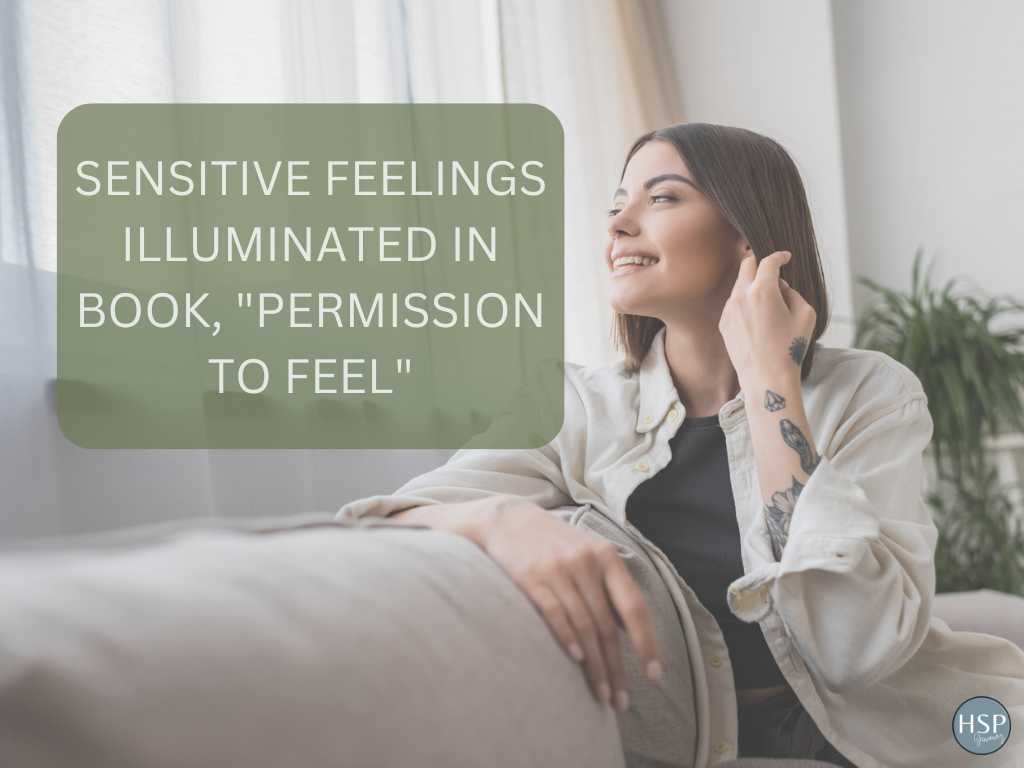Many highly sensitive people wrestle with their sensitive feelings on a daily, if not hourly, basis. If you’ve ever felt overwhelmed by your emotions or struggled to understand them, you’re not alone. “Permission to Feel” by Marc Brackett is a warm and insightful book that invites you to embrace your emotional life. After diving into its pages, it struck me how this book sheds light on the importance of emotions and their connection to our well-being.
As someone who has always been curious about the complexities of emotions, this book offered a blend of personal anecdotes and scientifically-backed strategies to help anyone looking to improve the management of sensitive feelings. It’s reassuring to read how Brackett emphasizes the importance of recognizing and expressing emotions for our overall well-being.
While the book doesn’t shy away from academic rigor—given Brackett’s background with the Yale Center for Emotional Intelligence—it remains accessible and engaging. The R.U.L.E.R. model introduced is particularly useful, offering a framework that anybody can apply, whether in personal life or professional settings. On the flip side, if brevity is more your style, you might find certain sections a tad extensive. Some readers might feel the book could convey its powerful message more concisely.
I decided to invite my dad to read this book with me as a weekly book club over the phone for just the two of us. My dad isn’t an emotional person and has struggled to understand me as a highly sensitive person. This research-backed book allowed us to bridge an emotional gap with one another, which helped us better understand the role of emotions in a person’s life.

Table of Contents
HSPs Struggle with Sensitive Feelings
For a friendly guide to navigating the vast sea of emotions, “Permission to Feel” is a worthwhile companion. It’s a book that balances the emotional with the intellectual, equipping you with tools to better understand yourself and your feelings. Ready to embark on a journey of emotional discovery? Click here to get your copy of “Permission to Feel” and start embracing your emotions today.

Overview of “Permission to Feel”
When you pick up “Permission to Feel,” it’s like unlocking a door to understanding the intricate world of emotions that lie within you. The book, highly rated and widely acclaimed, isn’t just a trove of research and theoretical knowledge; it’s a practical guide that makes you feel as though the author, Marc Brackett, is speaking directly to you. With insights from the Yale Center for Emotional Intelligence, it becomes clear why sensitive feelings are pivotal in every aspect of life, including the workplace.
You’ll discover the innovative R.U.L.E.R. Model, which empowers you to recognize, understand, label, express, and regulate your feelings. This compassionate roadmap for emotional well-being is as relevant to therapists and psychologists as it is to you, regardless of your profession or level of psychological understanding. While some readers find the book lengthy, its depth is indispensable for those seeking a meaningful transformation in emotional intelligence.
However, it’s not just about theory; real-life examples abound, resonating with your own experiences and making the science of emotions accessible. One point where opinions vary is the personal narrative section – for some it’s a highlight, for others, it’s less engaging. Nonetheless, “Permission to Feel” is a friendly companion in your journey to emotional mastery, minus an overload of technical jargon or stuffiness. Enjoy the read and embrace the emotional insights awaiting you.
Emotional Intelligence and Insight
Getting in touch with your emotions can be a transformative experience, and that’s exactly what “Permission to Feel” aims to help you with. As you flip through the pages, you’ll discover a treasure trove of insights on how to better understand and navigate your emotional landscape and sensitive feelings. You’ll appreciate the author’s deep dive into the power of emotional intelligence in every facet of life, especially when it comes to improving personal well-being and relationships.
While the book is a substantial read filled with compelling research, there are parts where the depth of information might feel overwhelming. Sometimes, you might find yourself skimming through sections to reach the core insights. This minor hiccup doesn’t overshadow the overall utility of the book, especially when you come across the R.U.L.E.R. Model—an empowering framework for managing emotions.
Whether you’re a professional in the psychology field or just someone looking to enhance your emotional awareness, this guide can serve as your companion. From the workplace to personal life, mastering your feelings is made approachable with the author’s wisdom and personal anecdotes, leaving you with a profound sense of empowerment. It’s a journey through the significance of emotions, distilled into a thought-provoking and reader-friendly format.
Looking for HSP Tools to Thrive in a Chaotic World?
The modern world is often overwhelming and stressful for those of us with sensitive nervous systems. Many of us have suffered from the challenges of high stress, anxiety, sensory overload, and mental health and physical health issues. Fortunately, after years of working with and researching Highly Sensitive People (HSPs), Julie Bjelland has developed many tools that have not only helped her but thousands of HSPs all over the world move out of survival mode living and into thriving. In this free webinar, she’ll share the tools that HSPs have found the most life-changing. Her goal is to help you live to your fullest potential because the world needs you.
Join this free webinar and get tools to help you thrive as an HSP!
Practical Applications for Sensitive Feelings
Exploring the realms of emotional intelligence through “Permission to Feel” can be a particularly enlightening experience for you. As you leaf through its pages, you may start to understand the true significance of emotions in your personal and professional spheres. The R.U.L.E.R. model stands out, serving as a guide to recognize, understand, label, express, and regulate emotions effectively.
While engrossed in the book, you’re likely to notice that it does not solely preach theories; instead, it offers robust, applicable insights into how to navigate your emotional world. For instance, being able to accurately name your emotions can seem like a simple exercise, but it is quite transformative when you practice it in real-life scenarios.
Though some readers found certain sections to include more detail than needed, you might appreciate the comprehensive coverage when applying these concepts to real situations, such as improving communication at work or bolstering relationships at home. Remember, your emotions have a significant role in shaping your daily life. Embracing them can lead to richer experiences and more meaningful interactions.
For anyone keen on enhancing their emotional acuity, whether you’re a therapist, educator, or someone on their personal growth journey, this book provides a treasure trove of valuable tools. Despite some reader comments about pacing and density in how this book is written, your takeaway is a greater sense of how to live emotionally intelligent—and that alone could be worth the read.
Key Features of “Permission to Feel”
Readable and Relatable Style
Imagine curling up with a guide that feels like a conversation with a wise friend. That’s the experience you get when you dive into “Permission to Feel”. The author’s choice of language is easy to follow and perfectly pitched to connect with readers from all walks of life. You won’t find any jargon-laden text here; rather, it’s like the author is right there, talking you through each chapter. This approachable style makes it quite compelling and allows for the concepts to resonate deeply with your own experiences.
Research-Based Content to Manage Sensitive Feelings
What sets this book apart is its strong foundation in research. Without bombarding you with numbers and studies, the book integrates insights from scientific studies into the narrative, giving credence to its discussions about emotional intelligence. However, don’t worry about getting bogged down with data. The research is woven into the text in a way that feels natural, enriching the book’s content without overwhelming you.

Looking for an HSP-Trained coach to help you align your life with your priorities?
Through my Highly Sensitive Person (HSP) certification with the Nickerson Institute, as well as being an HSP, I offer HSP coaching to develop specific goals around your HSP needs. We HSPs frequently deal with anxiety and overstimulated nervous systems that prevent us from achieving peace and attaining our life goals. HSP coaching with me includes a detailed review of your sensitivities and a mutually-desired plan for growth and management of this superpower to shift negativity and begin seeing yourself as the hero of your own story. (Affordable monthly coaching begins at $150/month.)
R.U.L.E.R. Model Explanation
A core component is the explanation of the R.U.L.E.R. model, an acronym that will stick with you long after you’ve turned the last page. The model is broken down into its components with precision, and while it’s a robust concept, the explanations are succinct and clear. Each element of the R.U.L.E.R. framework is discussed in a manner that feels applicable to your daily life, aiming to improve your emotional skills.
- Recognize: Identifying your own emotions
- Understand: Looking into the causes and consequences
- Label: Finding the right words for what you’re feeling
- Express: Communicating your feelings appropriately
- Regulate: Handling both your own and others’ emotions effectively
Real-Life Applications for Sensitive Feelings
You’ve read books that share theories that seem impractical in real life, right? Well, “Permission to Feel” is the opposite. It takes the discussion off the page and into your world. The text is dotted with scenarios that feel as real as your latest interaction at work or conversation with a friend. As you read, you’ll naturally start thinking about how you can apply the principles of emotional intelligence in your personal and professional life. The blend of storytelling with guidance invites you to reflect on past reactions and prepares you for future encounters.
- Use of emotional intelligence in daily decision-making
- Techniques to improve communication with peers and loved ones
- Tools for managing stress and fostering well-being
The authenticity of these applications is what makes the book not just informative but transformative. The goal here is not just to inform you, but to equip you to improve your emotional well-being.
In summary, don’t expect this book to provide direct formulas or act as a magic cure for emotional challenges. What it does exceptionally well is introduce a balanced perspective on emotions as vital pieces of the human experience. It encourages you, the reader, to embrace your feelings with understanding and without judgment.
This book is a toolbox, one that is filled with practical wisdom for navigating the complexity of emotions in everyday life. Whether it’s relishing the highs or managing the lows, “Permission to Feel” helps you to understand that your emotions are messengers, and learning their language can profoundly enrich your life.
Takeaways to Manage Sensitive Feelings
After spending quality time with “Permission to Feel,” it’s clear why it receives high praise. Embracing its central message—that emotions are a critical part of our existence—you’ll find the pages enriched with insights that could shift your approach to emotional intelligence. While some readers may find the depth of examples and studies overwhelming, these illustrate the potent impact of sensitive feelings in our lives.
The R.U.L.E.R. model presented is a gem for self-empowerment, giving you practical tools to navigate your feelings effectively. You might also appreciate the author’s anecdotes, which add a relatable touch, though for some, it might seem a tad extensive. Regardless of the detail, it’s a read that nurtures both personal and professional growth, as evidenced by its applicability suggested by therapists and coaches alike.
Remember, this isn’t merely a book—it’s a journey to understanding and expressing your emotions better. Whether absorbing the research or skimming to extract the essence, “Permission to Feel” invites you to a deeper conversation with yourself, an opportunity not to be missed if you’re on a path to emotional well-being.
Frequently Asked Questions
Where can Highly Sensitive People find resources or tools to help understand their sensitivity better?
If you’re finding yourself easily affected by your surroundings and emotions, some resources can assist in understanding this trait. Books like “Permission to Feel” by Professor Marc Brackett are excellent starting points. Online platforms also provide plenty of articles, forums, and communities where you can learn from shared experiences and expertise. Moreover, workshops and training sessions, often advertised on social media and websites dedicated to emotional intelligence, can offer practical advice and support.
What are common experiences or signs indicating someone might be a Highly Sensitive Person?
Highly Sensitive People (HSPs) often report feeling overwhelmed by sensory stimuli—loud noises or intense smells might be particularly uncomfortable. Emotionally, you might find yourself deeply empathetic, experiencing strong reactions to others’ feelings. Overstimulation in crowded or chaotic environments is another common sign, and you may need extra time to unwind after busy days or intense interactions.
What are some coping strategies for Highly Sensitive People when they feel overwhelmed?
If the world is feeling a bit too much, simple techniques may assist in managing your sensitivity. Deep breathing exercises can help center your mind amidst the chaos. Structuring quiet time into your day, perhaps through meditation or a peaceful walk, is another useful approach. Establishing a routine that includes regular breaks will also prevent overstimulation. Remember, expressing emotions is essential—acknowledging what you’re feeling is a powerful step toward managing it.
In what ways can a partner be supportive to a Highly Sensitive Person in a relationship?
Understanding is the bedrock of support within any relationship, especially if your partner is a Highly Sensitive Person. Listening actively without judgment when they share their feelings is crucial. Creating a comforting environment at home can minimize stressors that might cause discomfort. Be patient and provide reassurance, recognizing that your partner might process emotions and experiences in depth. Together, find activities that are enriching for both of you yet not overwhelming for your partner.
How can Highly Sensitive People set boundaries to protect their emotional well-being?
Setting boundaries is vital for maintaining your emotional health. Start by identifying your limits—what situations or environments are manageable, and which are not? Communicate these clearly and assertively to those around you. It’s okay to say no to invitations or demands that might lead to overstimulation. Prioritize self-care and ensure you have alone time to recharge. Establishing and respecting these boundaries enables you to interact with the world around you on your own terms.
Be sensitive, be free
*This post contains affiliate links and I will be compensated if you make a purchase after clicking on my links*





[…] steps can make them feel less overwhelming. This can help you focus on one step at a time and avoid feeling like you need to tackle everything at […]